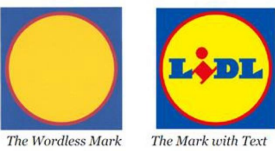The key issue in Lidl Great Britain Limited & Ors v Tesco Stores Limited & Ors [2024] EWCA Civ 262 revolved around Tesco’s use of a yellow circle in a blue square design as part of its Clubcard Prices Loyalty scheme. Lidl claimed that this design was similar to its emblem (referred to as The Wordless Mark” and “The Mark with Test”). Lidl claimed that Tesco’s use of identical parts amounted to trademark infringement, passing off, and copyright violation.
The High Court in the first instance decided in favour of Lidl, however, it also held some of Lidl’s trademark registration, particularly the Wordless Mark were “defensive trademarks” registered in bad faith, by which the proprietor had no intention of using it in the course of trade. Both Tesco and Lidl appealed the High Court judgment.
The examples of the designs of both featured in the Court of Appeal judgment were as follows:
Lidl:

Tesco:

The Decision
The Court of Appeal decided the following:
- Tesco’s appeal against the finding of passing off was dismissed. The Court of Appeal upheld the High Court’s finding that a substantial number of customers would be misled into thinking that Tesco’s Clubcard scheme and prices were a price-match to Lidl for equivalent goods.
- Tesco’s appeal against the finding of trademark infringement was also dismissed – Tesco’s campaign caused a change in consumer economic behaviour that caused a detriment to Lidl. Tesco’s Clubcard was successfully shown to have slowed their loss-rate of customers moving to Lidl, and Lidl had to carry out its own corrective advertising.
- Tesco’s appeal in part for copyright infringement was upheld, noting that although Tesco used the blue square and yellow circle, this was not use of a substantial portion of Lidl’s copyrighted work.
- The Court dismissed Lidl’s appeal over its wordless trademark registrations, upholding the earlier ruling that they were lodged in bad faith.
The conclusion is that, overall, Lidl was successful over Tesco in the legal battle over the design. Tesco will now have to rebrand its Clubcard loyalty scheme.
Implications
The case has significant ramifications with the Court of Appeal rejecting the earlier ruling on copyright infringement based on a more nuanced understanding of the legal issues involved. The verdict also highlights the dangers of submitting trademarks in bad faith, emphasising the necessity of real purpose and lawful usage when registering trademarks. As businesses navigate the competitive landscape, they must exercise caution to protect their brands whilst respecting the rights of others.
If you have any questions regarding this case, please get in touch with Tom Jones, David Moore, and/or Tod Davies in our Commercial Disputes team who will be able to support you.



